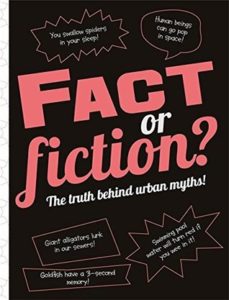Books
Utilizing Faculty Libraries to Combat Faux Information

Faux information is a time period I hate to make use of as a result of it has been taken by a sure president and his cronies to devalue any form of information story that displays negatively on his administration.
Nonetheless, as somebody who works with teenagers every day in a faculty library, it’s a time period that they use freely as they attempt to navigate the murky waters of what’s actual and never actual in at the moment’s bottomless info dump that’s the information cycle.
To fight faux information, or disinformation, or no matter you wish to name it, I created a sequence of classes that I’ve delivered to college students in London over the previous few weeks. After every lesson I’ve surveyed the scholars and have been pleasantly stunned to be taught that they’ve discovered these classes efficient in educating them on methods to keep away from and detect faux information.
It’s a reasonably straight ahead class: the aim is to begin producing dialogue, as a result of it’s not till you could have real dialogue concerning the info you take in will you be capable of be vital about it.
I begin by asking them why faux information is created and who they assume creates it. I file their solutions on a fantastic free academic device known as Nearpod, however you don’t want Nearpod to do that lesson in any respect.
The solutions I’ve been getting from the scholars (ages 11–13) are fairly spot on. They are going to say information organisations themselves create faux information, hackers, pranksters, individuals attempting to generate profits, and extra. I deal with the final level: a number of faux information in my view is generated for click on bait and due to this fact advert income. Most of the college students knew this however rather a lot had been unaware that web pages get cash from the variety of clicks they obtain.
College students additionally speak about cancel tradition and the truth that faux information may be created to precise revenge on individuals. We talk about the hazards of this after which I present them info from a website known as 30 Seconds which has nice sources for academics and educators in preventing faux information.
Class ID: 45597
Verify Your Shelf Publication
Signal as much as obtain Verify Your Shelf, the Librarian’s One-Cease Store For Information, Ebook Lists, And Extra.
Thanks for signing up! Control your inbox.
By signing up you comply with our Phrases of Service
I then e-book speak a fantastic e-book known as Reality or Fiction? which is one other stellar useful resource in terms of dispelling city myths and pretend tales that usually find yourself on locations like Fb.
I then ask college students to consider their very own actions, and ask them to consider why they share faux information tales. It’s a difficult one as a result of no one needs to consider themselves as a part of an enormous drawback in disinformation and we’re all complicit in some methods in sharing information tales or being duped by issues that might not be completely true.
Ninety p.c of the scholars I spoke to stated the vast majority of faux information they find yourself sharing comes from humorous memes that they really feel are innocent. I agree that a few of them may seem innocent or foolish but when they’re spreading misinformation about different individuals or mocking disabilities or different individuals’s beliefs or backgrounds, it’s a very completely different story. We ended up having a really frank dialogue round memes and pretend information which I hoped proved useful to the scholars.
To finish the lesson, we take a look at the impression that faux information has, and the scholar enter was as soon as once more very insightful. They mentioned the way it can unfold worry, racist concepts and panic. That is one thing that’s all too true in at the moment’s society and I used to be very completely happy to see the scholars’ responses to this.
We additionally checked out methods to identify a faux information story which incorporates:
Dangerous punctuation and grammar together with headlines in all caps and with tons of exclamation factors.
Looking on the writer of the article, what else have they revealed, have they got a particular agenda?
Verify the sources of the article.
Verify the date.
Learn the “About Us” part of the positioning to see what the corporate or website’s stance is.
Has the information story been picked up by trusted information retailers?
I direct them to the Harvard Summer time Faculty Net Website which has a fantastic part on faux information.
Libraries are one of many previous couple of bastions of fact that exist on the earth and in my view it’s our job to make sure that college students are conscious of the hazards of faux information and are geared up with the instruments to identify misinformation when it occurs.



